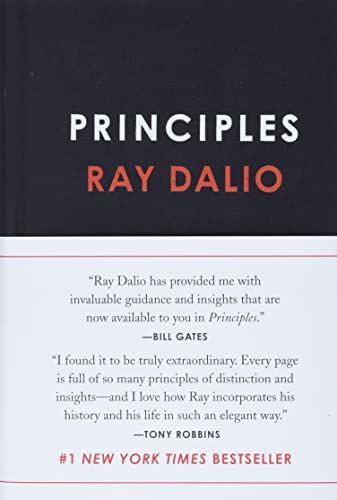
Principles
#1 New York Times Bestseller “Significant...The book is both instructive and surprisingly moving.” —The New York Times Ray Dalio, one of the world’s most successful investors and entrepreneurs, shares the unconventional principles that he’s developed, refined, and used over the past forty years to create unique results in both life and business—and which any person or organization can adopt to help achieve their goals. In 1975, Ray Dalio founded an investment firm, Bridgewater Associates, out of his two-bedroom apartment in New York City. Forty years later, Bridgewater has made more money for its clients than any other hedge fund in history and grown into the fifth most important private company in the United States, according to Fortune magazine. Dalio himself has been named to Time magazine’s list of the 100 most influential people in the world. Along the way, Dalio discovered a set of unique principles that have led to Bridgewater’s exceptionally effective culture, which he describes as “an idea meritocracy that strives to achieve meaningful work and meaningful relationships through radical transparency.” It is these principles, and not anything special about Dalio—who grew up an ordinary kid in a middle-class Long Island neighborhood—that he believes are the reason behind his success. In Principles, Dalio shares what he’s learned over the course of his remarkable career. He argues that life, management, economics, and investing can all be systemized into rules and understood like machines. The book’s hundreds of practical lessons, which are built around his cornerstones of “radical truth” and “radical transparency,” include Dalio laying out the most effective ways for individuals and organizations to make decisions, approach challenges, and build strong teams. He also describes the innovative tools the firm uses to bring an idea meritocracy to life, such as creating “baseball cards” for all employees that distill their strengths and weaknesses, and employing computerized decision-making systems to make believability-weighted decisions. While the book brims with novel ideas for organizations and institutions, Principles also offers a clear, straightforward approach to decision-making that Dalio believes anyone can apply, no matter what they’re seeking to achieve. Here, from a man who has been called both “the Steve Jobs of investing” and “the philosopher king of the financial universe” (CIO magazine), is a rare opportunity to gain proven advice unlike anything you’ll find in the conventional business press.
Reviews
Timeo Williams@timeowilliams
Lena Köninger@larouge
Erik Horton@erikhorton
Carlos Becker@caarlos0
Bouke van der Bijl@bouk
Jimmy Cerone@jrcii
Felipe Saldarriaga @felipesaldata
Stephanie @stephanie
Neil Murray@neilswmurray
Ethan Ding@ethanding
Udit Desai@uydesai
Bradford Fults@h3h
Pranav Mutatkar@pranavmutatkar
Angel Herrera@aherrera
Nat Welch@icco
Diana Platgalve@dianaplatgalve
Doug Belshaw@dajbelshaw
Omar@omareduardo
Ivaylo Durmonski@durmonski
Lance Willett@lancewillett
Simon Bronders@simonbronders
Hugo Ahlberg@hugo
Josh Dzarir@josh
Eihab Khan@eihab
Highlights
Stephanie @stephanie
Stephanie @stephanie
Stephanie @stephanie
Stephanie @stephanie
Stephanie @stephanie
Stephanie @stephanie
Page 144
Stephanie @stephanie
Page 56
Stephanie @stephanie
Guillaume Gelin@ramnes
Guillaume Gelin@ramnes
Guillaume Gelin@ramnes
Guillaume Gelin@ramnes
Guillaume Gelin@ramnes
Guillaume Gelin@ramnes
Guillaume Gelin@ramnes